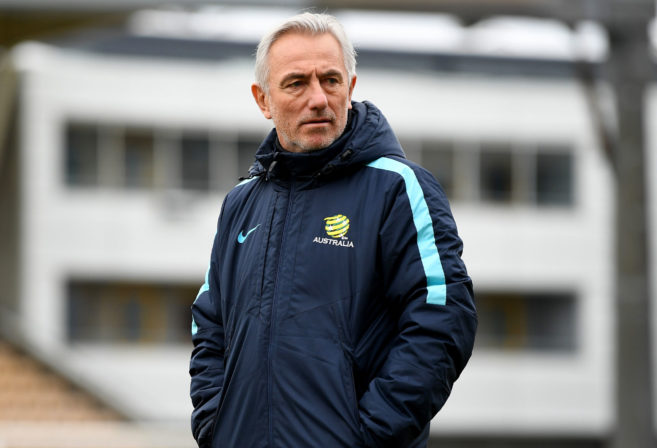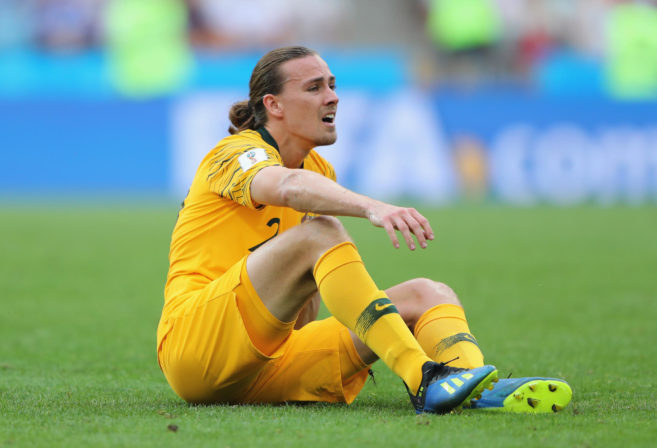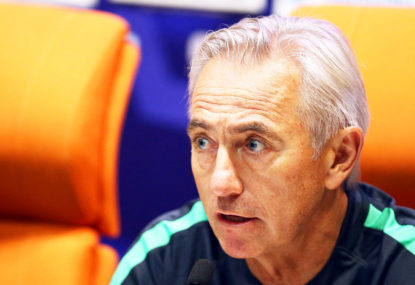My dog explodes into a frenzy of barks every time a postman knocks on our front door. It’s in his nature to do it; spaniels have had this instinctive reaction bred into them over hundreds of years.
But the fact that this is totally expected behaviour doesn’t make me any less startled when the piercing yaps begin, or any less compelled to shush him, while I prepare to enter into the mutually acknowledged charade of squiggling what is clearly not my signature into the postie’s oddly retro-looking device.
Over their three World Cup games, Bert van Marwijk set the Socceroos up, and made his in-game adjustments, in accordance with his own instincts which prioritised defensive structure and conservatism.
It’s in his nature to do that too, and it came to the surprise of no one who has given his managerial career even a passing glance.
The only change he made to his starting XI was forced by injury. He made the same substitutions, at around the same moments in each match. He instructed the team, by and large, to play the same way against all three opponents.
The frustration is, is that my dog doesn’t have the cognitive function to work out that every knock on the door isn’t the violent home invader to which his barking is designed to alert us.
Chippy the Tibetan spaniel is incapable of applying context; 2:15 in the afternoon on a Thursday in an inner Melbourne suburb is not the time or place most axe-wielding maniacs choose to strike.
It’s hard to know whether he even remembers the previous 287 occasions where I wasn’t hacked down and stuffed into a bin liner after answering a knock on the door.
Van Marwijk can see the changing contexts. He can see what has happened and is likely to happen again, and he should be able to adjust. But he didn’t, and although he was never likely to, it’s hard not to be startled by the fact.

(Photo by Michael Regan/Getty Images)
It’s difficult to sum up the campaign while the disappointment of a bottom-of-the-group exit is still boring a bitter pit in the gut.
So many of the players gave us genuine reason to applaud after looking shaky in the warm-up games with the entire Guardian football writing staff, among others, calling that Mark Milligan be replaced in the starting XI in what’s surely his last World Cup. He was fantastic; a real rock in defence with a passing range most midfielders would envy.
Mile Jedinak’s poise from the penalty spot adds another steely layer to his statuesque reputation. For all of his difficulties at the other end, Josh Risdon defended with aplomb against better attackers than he’s ever faced in his professional career.
Aaron Mooy showed he can set the tempo of a match at any level. The glints Daniel Arzani gave us have sparked a hopeful flame that helps to warm up the chilling despondency this exit has blown in.
Ange Postecoglou arranged this team to try and wring out every bit of attacking potency it had, often at the expense of any semblance of defensive integrity, especially in the final year of his tenure.
In spite of that, Australia still had matches where they’d whirr around in the opposition half, offer plenty of energy and activity, rack up the shots, and still not score.
The lack of a cutting edge, even when the team was geared principally around maximising what modest edge they had, has been this team’s biggest problem.
Any team scouting Australia will know this, and will feel comfortable as a result. After all, to one degree or another, all our group stage opponents were allowing us a certain degree of control in their half.
So yes, van Marwijk’s system let us to compete in games, to limit opposition chances and offer a stable platform to create some of our own.
[latest_videos_strip category=”football” name=”Football”]
But the offensive ceiling of this team was low before he arrived, and was lowered by van Marwijk’s system and our heads reached it, just about.
Had Andrew Nabbout not been injured, could anyone reasonably argue van Marwijk wouldn’t have started him in the Peru game, having tried but failed to register a single shot on or off target over the first two games?
The value of Nabbout’s industry dropped from game to game, as the need for goals increased.
But it probably took a dislocated shoulder to change his level of involvement.
Having not visibly aided our desperate charge for a late goal against Denmark, did van Marwijk think subbing Tom Rogic for Jackson Irvine would have a different effect against Peru, or was he simply rolling through the same robotic, predetermined process he had in the two games prior?

(Photo by Simon Hofmann – FIFA/FIFA via Getty Images)
“We had trouble, at this level, to score a goal,” van Marwijk said after the Peru match.
Of course we’ll never know now, and talking about it is, to some extent, simply self-flagellating with the whip of regretful what-ifs.
But would Jamie Maclaren have posed more of a threat than Tomi Juric did against Peru. In a similar vein, what if Matt Leckie had played as a striker, or Arzani had got more than half an hour with exhausted teammates?
We had trouble scoring against Denmark too, and really shouldn’t have been gifted that VAR penalty, but that didn’t seem to spur van Marwijk on to shake things up in the next must-win game.
Guus Hiddink, in that storied penalty shoot-out win over Uruguay in 2005, took off Tony Popovic and brought on Harry Kewell – the latter a shock exclusion in arguably the most important game in Australia’s football history to that point – in the 32nd minute, one of those rare first-half tactical substitutions.
The game was 0-0 at that point, and Uruguay had had at least one great chance.
Conservatism was thrown out as Popovic trotted off, and Kewell came on.
The point of bringing this up is not to compare those two Socceroos vintages, which are starkly different, but more to show that there is value in improvising tactically, successfully or otherwise, in un-digging your heels and taking a risk when the stakes are at their highest; in not being predictable.
At the very least, it helps banish the lingering pain of punished inaction, of tactical torpor, when changes are made too late, if at all.
Gosh, I’m looking forward to the Uruguay and Portugal Round of 16 clash, as well as Belgium and England.
There’s a new slate for the Socceroos now, and Graham Arnold will surely steward a markedly changed squad in the next Asian Cup; perhaps an attacking unit of Arzani, Rogic, Matt Leckie behind – and why not indulge in a wild fantasy now – Ispwich’s Ben Folami will scorch through the tournament in 2019.
Bert has come and gone, and he was just as we thought he’d be, so now all we can do is stride onward with a hopeful skip in our step.































































































